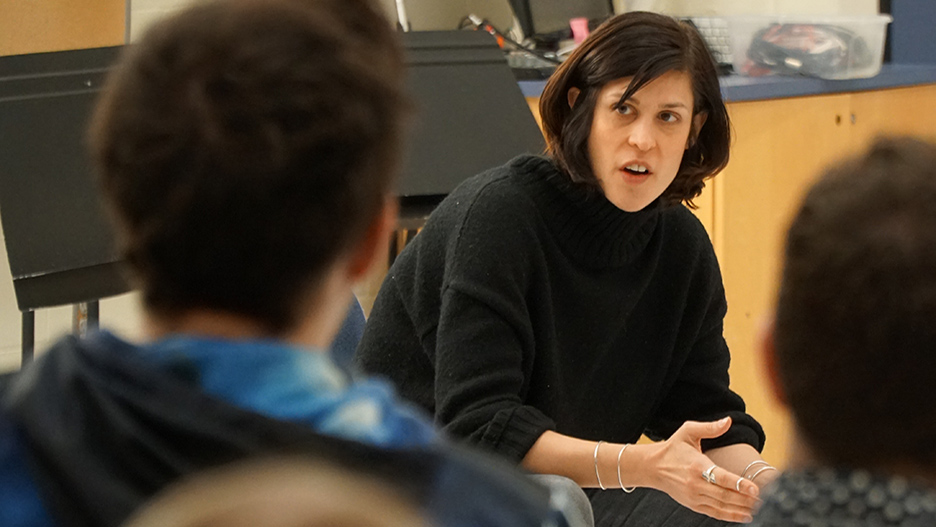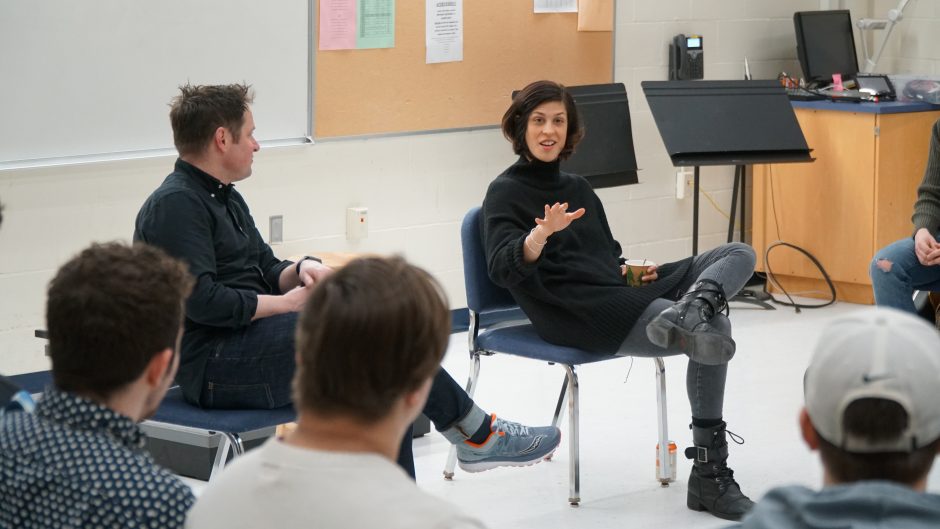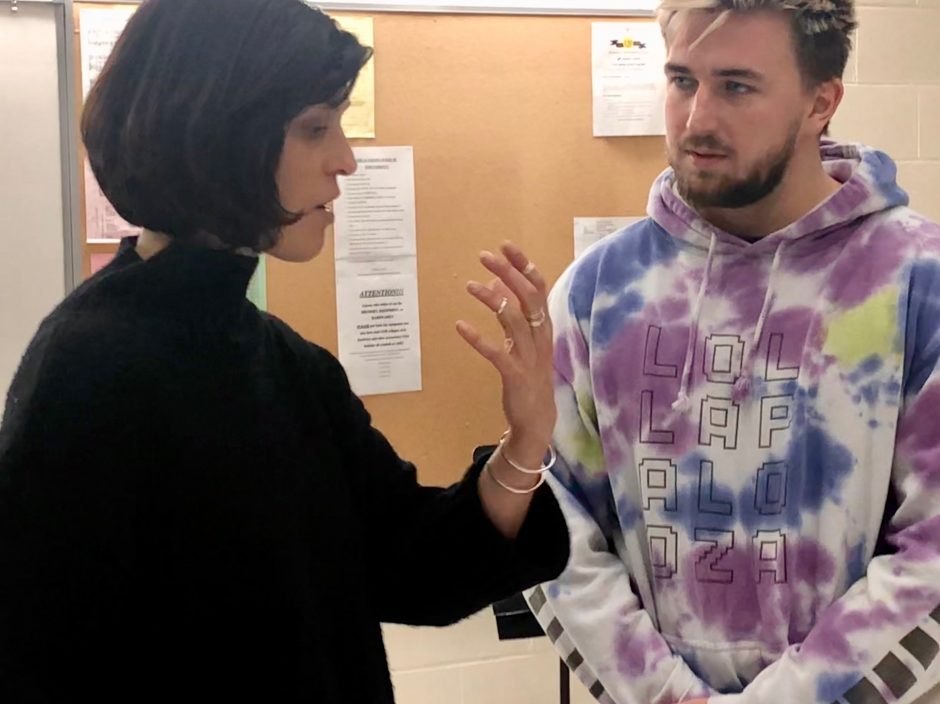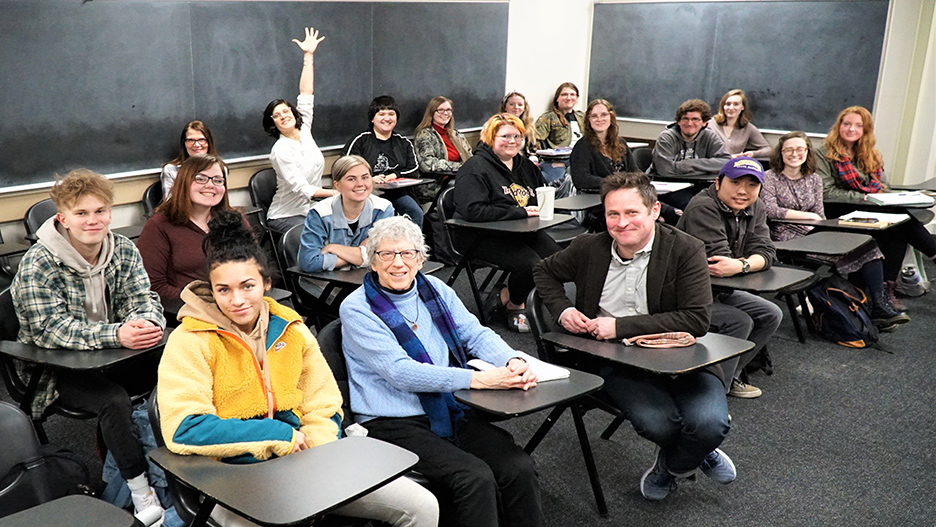Like her own work, Dessa’s classroom visits crossed disciplines and made an impact

At times, she would read from her recent memoir, but the story she told to students over three days of classroom talks was a different kind of read altogether. Call it “Dessa: The Owner’s Manual.”
What feeds her head. How she sustains herself in work, inspiration and repeat. What’s vital to do on the way up and how to prep for the way down. What’s sacrificed and — most relevant to her visit — how it all led to a rewarding life in art.
“To be honest, I think there’s an insatiability that’s bad for me as an organism that’s good for my career,” she told Scott LeGere’s music industry class. “For me it’s worth trading off some of that structure for all the other things that this life gives me.
“It does give you so much,” she said. “You get to see people from all different parts of life being moved. I feel like you get to understand what it’s like to be a human being better in this job than you do in others because people are game to come up to you and talk to you about their [lives].”
Music industry students, creative writing students, gender studies students and art students all had access to Dessa as part of a three-day visit this week (Feb. 24-26) through the University’s Minnesota Storytellers residency. The visit included a sold-out evening performance on Monday, the first day of her visit.
“If you are not overcome with feeling when you’re performing a song, maybe you rewrite the damn song.”
Dessa
In mostly Q & A formats in seven classes plus a student radio interview on KMSU, she offered bits of her own rise-to-fame story — as a member of hip-hop collective Doomtree, as a solo performer, a poet, writer — along with practical advice suited perfectly for students of an industry that’s well past the days of solely chasing major label attention.

In what’s now more of a do-it-yourself environment, key qualities to have must include kindness and having the kinds of ideas and proposals that make people want to take your call, she said.
“What I often say, is: is this a mutual win?,” she said to a 9 a.m. music industry class. “’Are you feeling good about this and feeling like you’ve got something banging?’ And inviting people to tell you ‘I’m not getting paid enough.’ Because if that’s really true and they’re silently thinking that, they’re going to quit the band.”
She offered examples of mutual wins on a budget, such as bartering with a photographer who needs wordsmithing for a web site when your band need promo shots. To one student’s question about how to get music videos produced, Dessa said the key is contacts who can be as nearby as her own classmates.
“You are in a really special place to get this done,” Dessa said. “Because if I’m not wrong there’s lot of students studying videos, here, right? They’ve got to do final projects and [you] need a music video. There has to be an easy win there. … There’s so much that can happen without money.”

The range of classes and topics visited – from writing to book publishing to rapping to marketing and business planning – was by design.
“Education’s going to succeed when we break down more and more departmental silos and help students prepare for a changing work environment,” said LeGere, who moderated Dessa’s classroom visits.
Second-year music industry major Luke McGreavey said the three-day residency was the highlight of his time at the University thus far. In addition to having Dessa in class, McGreavey and others worked on setting up equipment and tearing it down after Dessa’s concert. In classroom or on the set, he said, she was level and appreciative of what students were doing.
“She was extremely helpful. She showed up ready to go and she was very vocal with her appreciation with all the tiny little things we had helped with in setup,” he said. “It was nice to meet an artist who was somehow even nicer than you would expect them to be.
“She is surprisingly very real,” said McGreavey, who wants to work as a music supervisor in film. “It’s just like talking to another classmate. She made it very easy and comfortable. When you meet someone of that stature you get kind of intimidated by them. You speak to Dessa and that intimidation goes away. She can tell that we’re trying to better ourselves. She was trying to be as helpful as humanly possible.”
“I look at her and I see part of me,” said McKenzie Lange, a junior music industry major. “I’m a performer, I’m a singer, and I really want to know how someone like her got where she is. And I know she’s just another person trying to figure out where she is.”
Dessa said she and her manager approach her music career as though they’re in a train and have to jump out every now and then and lay down tracks, then get back in the train and drive it forward, incrementally.
As a songwriter on her own as well as with the hip-hop collective Doomtree, she encouraged students to search for the reason to write, versus the desire to simply put out a song. If you’re faking sincerity, she said, everyone can tell.
“If you are not overcome with feeling when you’re performing a song, maybe you rewrite the damn song,” she said. “It should [mess] you up. It should [mess] you up because it’s so true and you’re here in front of everybody singing it.”
She said she appreciated the chance to give students some insight.
“I think classrooms are microcosms not only of the music industry, but of people,” she said following one morning class. “It’s all types. And having the opportunity to speak frankly about something I love, and that’s been hard, and that’s been the source of the biggest pride and the biggest disappointments of my life – it feels good to be able to voice the big part of the story that happens offstage.”

Things occasionally got personal when she addressed the darker side of throwing herself into her work, using stories of complicated love — romantically and with family — as among risks involved.
“There will be hurt,” she told a class, “so enjoy the good as its happening and enjoy the art in and of itself enough to make that pain worth suffering.”
For all the stories and advice she could offer, she underlined, it’s indeed the art-in-and-of-itself that’s primary.
“Are you making work that you’re proud of?” she said. “Because this will all end. Is the work in and of itself beautiful and true and at the end of your career can you look back and say: ‘I stand by that.’”
Speak Your Mind